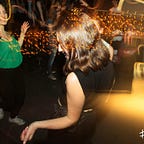Stroke of Bilingualism
Written to the song: My Future — Billie Eilish
“Strokes don’t discriminate…it can happen to anyone” — Linda Steuer
Being bilingual is defined as having the ability to speak and understand more than one language. When someone has a stroke, they often have impairments in their language abilities. What happens when a bilingual individual experiences a stroke, are both languages impacted equally?
When a person has a stroke, they may experience numbness, confusion, and the inability to speak. There are various types of strokes that limit the amount of oxygen and nutrients that can be sent to the brain. Ischemic strokes are caused by a blood clot that blocks the blood flow to the brain. A transient ischemic stroke (TIA) is called a “mini-stroke” as it is caused by a temporary blood clot, which typically passes over a short period of time but may precede a full stroke. Finally, a hemorrhagic stroke is caused by a ruptured blood vessel preventing blood flow to the brain.
If a stroke occurs in the area of the brain that controls language, an individual may experience “aphasia” which inhibits the ability to speak, understand, repeat, and write — all at different levels. Aphasia impacts each person differently and there are different types, although most studies on aphasia have been performed on aphasia patients who are monolingual English speakers.
There are many different types of bilinguals. Your bilingualism is dependent on when you learned the languages, how long you’ve used them for, and how you practice your language. For example, “passive bilinguals” are able to read and understand a language but cannot actively speak it. “Coordinate bilinguals” have two separate lexical systems (language representations in the brain) that are fused together. “Compound bilinguals” use both languages throughout their lives. When one language is not used often enough, it may go under the process of reduced activation of that language, as the brain eliminates irrelevant information to make space for new connections.
The predictions on what happens to the bilingual brain after stroke are relatively uncertain as outcomes are dependant on the level of bilingualism as well as the severity of the stroke and the patient’s language abilities beforehand. For example, if a patient is a Ph.D. educated individual who is fluent in 3 languages suffers from a stroke — it will take a long time for them to recover and regain all of the vocabulary and language abilities that they had before the stroke. Although, what is interesting is many people who have experienced a stroke fully revert to their original spoken language. That means that if someone born in Ethiopia spoke Amharic their whole life until moving to Canada and learning English in their 20s, may revert to Amharic after their stroke. This can happen when the language systems of the distinct languages are separate in the brain, and one of the languages have been impacted by the stroke. The brain compensates for weakness in one area and turns to the other area. This means that if a person that learned Japanese first and French second, may have two distinct language centres in the brain. If the French language centre has been disturbed, the language part of the brain will focus on Japanese.
Will these individuals ever get better? Our brains are powerful and have the opportunity to grow and change through neuroplasticity. With speech therapy and rehabilitation, the brain continues to grow and heal post-stroke. Outcomes post-stroke are dependent on the individual rehabilitation plan, as well as their individual language strengths, abilities, education and personality. While the brain is so powerful, there is still so much to learn about how the brain functions, thrives and heals.
Sources:
Kuzmina, E., Goral, M., Norvik, M., & Weekes, B. S. (2019, February 13). What Influences Language Impairment in Bilingual Aphasia? A Meta-Analytic Review. Retrieved from https://www.frontiersin.org/articles/10.3389/fpsyg.2019.00445/full
